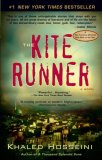Reading Guide Questions

Please be aware that this discussion guide will contain spoilers!
Introduction
Khaled Hosseini's stunning debut novel
The Kite Runner follows a young boy, Amir, as he faces the challenges that confront him on the path to manhood - testing friendships, finding love, cheating death, accepting faults, and gaining understanding. Living in Afghanistan in the 1960s, Amir enjoys a life of privilege that is shaped by his brotherly friendship with Hassan, his servant's son. Amir lives in constant want of his father's attention, feeling that he is a failure in his father's eyes. Hassan, on the other hand, seems to be able to do no wrong. Their friendship is a complex tapestry of love, loss, privilege, and shame.
Striving to be the son his father always wanted, Amir takes on the weight of living up to unrealistic expectations and places the fate of his relationship with his father on the outcome of a kite running tournament, a popular challenge in which participants must cut down the kites of others with their own kite. Amir wins the tournament. Yet just as he begins to feel that all will be right in the world, a tragedy occurs with his friend Hassan in a back alley on the very streets where the boys once played. This moment marks a turning point in Amir's life
—one whose memory he seeks to bury by moving to America. There he realizes his dream of becoming a writer and marries for love but the memory of that fateful day will prove too strong to forget. Eventually it draws Amir back to Afghanistan to right the wrongs that began that day in the alley and continued in the days, months, and years that followed.
Discussion Questions
- The novel begins with Amir's memory of peering down an alley, looking for Hassan who is kite running for him. As Amir peers into the alley, he witnesses a tragedy. The novel ends with Amir kite running for Hassan's son, Sohrab, as he begins a new life with Amir in America. Why do you think the author chooses to frame the novel with these scenes? Refer to the following passage: "Afghans like to say: Life goes on, unmindful of beginning, end...crisis or catharsis, moving forward like a slow, dusty caravan of kochis [nomads]." How is this significant to the framing of the novel?
- The strong underlying force of this novel is the relationship between Amir and Hassan. Discuss their friendship. Why is Amir afraid to be Hassan's true friend? Why does Amir constantly test Hassan's loyalty? Why does he resent Hassan? After the kite running tournament, why does Amir no longer want to be Hassan's friend?
- Early in Amir and Hassan's friendship, they often visit a pomegranate tree where they spend hours reading and playing. "One summer day, I used one of Ali's kitchen knives to carve our names on it: 'Amir and Hassan, the sultans of Kabul.' Those words made it formal: the tree was ours." In a letter to Amir later in the story, Hassan mentions that "the tree hasn't borne fruit in years." Discuss the significance of this tree.
- We begin to understand early in the novel that Amir is constantly vying for Baba's attention and often feels like an outsider in his father's life, as seen in the following passage: "He'd close the door, leave me to wonder why it was always grown-ups time with him. I'd sit by the door, knees drawn to my chest. Sometimes I sat there for an hour, sometimes two, listening to their laughter, their chatter." Discuss Amir's relationship with Baba.
- After Amir wins the kite running tournament, his relationship with Baba undergoes significant change. However, while they form a bond of friendship, Amir is still unhappy. What causes this unhappiness and how has Baba contributed to Amir's state of mind? Eventually, the relationship between the two returns to the way it was before the tournament, and Amir laments "we actually deceived ourselves into thinking that a toy made of tissue paper, glue, and bamboo could somehow close the chasm between us." Discuss the significance of this passage.
- As Amir remembers an Afghan celebration in which a sheep must be sacrificed, he talks about seeing the sheep's eyes moments before its death. "I don't know why I watch this yearly ritual in our backyard; my nightmares persist long after the bloodstains on the grass have faded. But I always watch, I watch because of that look of acceptance in the animal's eyes. Absurdly, I imagine the animal understands. I imagine the animal sees that its imminent demise is for a higher purpose." Why do you think Amir recalls this memory when he witnesses Hassan's tragedy in the alleyway? Amir recollects the memory again toward the end of the novel when he sees Sohrab in the home of the Taliban. Discuss the image in the context of the novel.
- America acts as a place for Amir to bury his memories and a place for Baba to mourn his. In America, there are "homes that made Baba's house in Wazir Akbar Khan look like a servant's hut." What is ironic about this statement? What is the function of irony in this novel?
- What is the significance of the irony in the first story that Amir writes? After hearing Amir's story, Hassan asks, "Why did the man kill his wife? In fact, why did he ever have to feel sad to shed tears? Couldn't he have just smelled an onion?" How is his reaction to the story a metaphor for Amir's life? How does this story epitomize the difference in character between Hassan and Amir?
- Why is Baba disappointed by Amir's decision to become a writer? During their argument about his career path, Amir thinks to himself: "I would stand my ground, I decided. I didn't want to sacrifice for Baba anymore. The last time I had done that, I had damned myself." What has Amir sacrificed for Baba? How has Amir "damned himself"?
- Compare and contrast the relationships of Soraya and Amir and their fathers. How have their upbringings contributed to these relationships?
- Discuss how the ever-changing politics of Afghanistan affect each of the characters in the novel.
- On Amir's trip back to Afghanistan, he stays at the home of his driver, Farid. Upon leaving he remarks: "Earlier that morning, when I was certain no one was looking, I did something I had done twenty-six years earlier: I planted a fistful of crumpled money under the mattress." Why is this moment so important in Amir's journey?
- Throughout the story, Baba worries because Amir never stands up for himself. When does this change?
- Amir's confrontation with Assef in Wazir Akar Khan marks an important turning point in the novel. Why does the author have Amir, Assef, and Sohrab all come together in this way? What is this the significance of the scar that Amir develops as a result of the confrontation? Why is it important in Amir's journey toward forgiveness and acceptance?
- While in the hospital in Peshawar, Amir has a dream in which he sees his father wrestling a bear: "They role over a patch of grass, man and beast...they fall to the ground with a loud thud and Baba is sitting on the bear's chest, his fingers digging in its snout. He looks up at me, and I see. He's me. I am wrestling the bear." Why is this dream so important at this point in the story? What does this dream finally help Amir realize?
- Amir and Hassan have a favorite story. Does the story have the same meaning for both men? Why does Hassan name his son after one of the characters in the story?
- Baba and Amir know that they are very different people. Often it disappoints both of them that Amir is not the son that Baba has hoped for. When Amir finds out that Baba has lied to him about Hassan, he realizes that "as it turned out, Baba and I were more alike than I'd never known." How does this make Amir feel about his father? How is this both a negative and positive realization?
- When Amir and Baba move to the States their relationship changes, and Amir begins to view his father as a more complex man. Discuss the changes in their relationship. Do you see the changes in Baba as tragic or positive?
- Discuss the difference between Baba and Ali and between Amir and Hassan. Are Baba's and Amir's betrayals and similarities in their relationships of their servants (if you consider Baba's act a betrayal) similar or different? Do you think that such betrayals are inevitable in the master/servant relationship, or do you feel that they are due to flaws in Baba's and Amir's characters, or are they the outcome of circumstances and characters?
For more information about other Penguin Readers Guides, please call the Penguin Marketing Department at (800) 778-6425, email at reading@penguinputnam.com or write to us at: Penguin Books, Marketing Department CC, Readers' Guides, 375 Hudson Street, New York, NY 10014-3657
Unless otherwise stated, this discussion guide is reprinted with the permission of Riverhead Books.
Any page references refer to a USA edition of the book, usually the trade paperback version, and may vary in other editions.




